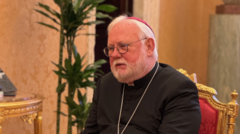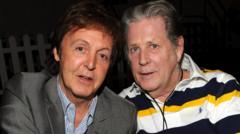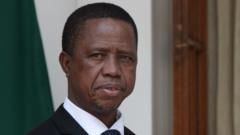Archbishop Paul Gallagher's insights shed light on Pope Francis's unwavering dedication to the marginalized and his rejection of advice to reduce his workload in his twilight years.
Pope Francis Ignored Calls to Slow Down, Driven by Desire to Help the Marginalized, Says Archbishop

Pope Francis Ignored Calls to Slow Down, Driven by Desire to Help the Marginalized, Says Archbishop
In an exclusive interview, Archbishop Gallagher reveals Pope Francis's steadfast commitment to his mission despite health issues.
In a recent conversation with BBC News, Archbishop Paul Gallagher, the Vatican's foreign minister since 2014, shared poignant reflections on Pope Francis, who passed away at the age of 88 after battling double pneumonia. Gallagher highlighted the Pope's refusal to slow down, motivated by a deep desire to uplift the powerless and address global issues.
Pope Francis was characterized by Gallagher as compassionate yet resolute. While acknowledging the Pope's gentle disposition, he noted that Francis often disregarded advice from his inner circle. "He didn't run away from difficult things," Gallagher said, recognizing the courage the Pope displayed in facing challenges.
The archbishop, who traveled extensively with the Pope, recalled how deeply Francis resonated with the plight of vulnerable populations, particularly migrants, women, and children affected by conflict. Gallagher suggested that the Pope believed his active role could genuinely alleviate suffering, driving him to continue his work even as he faced health challenges. "He thought it had been 66 or 67 years since he took a holiday," Gallagher noted.
Pope Francis's inaugural trip outside Rome was a poignant visit to migrants on the Italian island of Lampedusa, after which he journeyed to over 60 countries, often defying the counsel of advisers. Gallagher recounted a notable moment when Francis expressed his intent to visit the Central African Republic despite concerns over safety: "He said 'well I'm going and if nobody wants to come, fine, I'll go on my own.'"
The archbishop highlighted that Francis aimed to humanize discussions about migrants, urging officials to remember their humanity rather than viewing them as mere statistics. Throughout his travels, Pope Francis displayed a preference for engaging with ordinary people rather than political elites, occasionally appearing disinterested during formal events.
Gallagher emphasized that Pope Francis's legacy includes dismantling barriers between the Church and the general public, presenting himself as approachable and relatable. The Pope's final words to Gallagher encapsulated his spirit: "Don't lose your sense of humour," he encouraged.
As the world mourns the Pope's passing, more than 250,000 people paid their respects during his lying-in-state at St Peter's Basilica, a testament to the profound impact he had on countless lives. His funeral, set for Saturday, will draw global attention, with live coverage provided by major news outlets.
Pope Francis was characterized by Gallagher as compassionate yet resolute. While acknowledging the Pope's gentle disposition, he noted that Francis often disregarded advice from his inner circle. "He didn't run away from difficult things," Gallagher said, recognizing the courage the Pope displayed in facing challenges.
The archbishop, who traveled extensively with the Pope, recalled how deeply Francis resonated with the plight of vulnerable populations, particularly migrants, women, and children affected by conflict. Gallagher suggested that the Pope believed his active role could genuinely alleviate suffering, driving him to continue his work even as he faced health challenges. "He thought it had been 66 or 67 years since he took a holiday," Gallagher noted.
Pope Francis's inaugural trip outside Rome was a poignant visit to migrants on the Italian island of Lampedusa, after which he journeyed to over 60 countries, often defying the counsel of advisers. Gallagher recounted a notable moment when Francis expressed his intent to visit the Central African Republic despite concerns over safety: "He said 'well I'm going and if nobody wants to come, fine, I'll go on my own.'"
The archbishop highlighted that Francis aimed to humanize discussions about migrants, urging officials to remember their humanity rather than viewing them as mere statistics. Throughout his travels, Pope Francis displayed a preference for engaging with ordinary people rather than political elites, occasionally appearing disinterested during formal events.
Gallagher emphasized that Pope Francis's legacy includes dismantling barriers between the Church and the general public, presenting himself as approachable and relatable. The Pope's final words to Gallagher encapsulated his spirit: "Don't lose your sense of humour," he encouraged.
As the world mourns the Pope's passing, more than 250,000 people paid their respects during his lying-in-state at St Peter's Basilica, a testament to the profound impact he had on countless lives. His funeral, set for Saturday, will draw global attention, with live coverage provided by major news outlets.






















